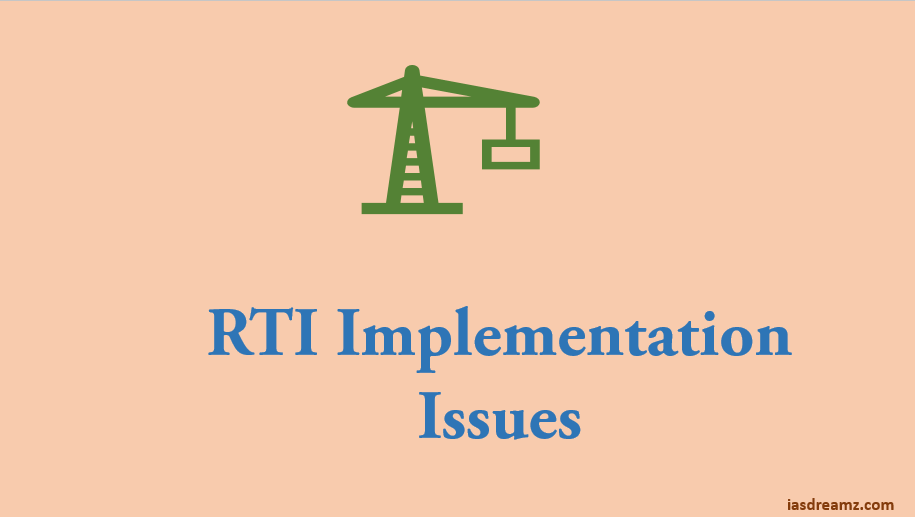Implementation of the RTI Act is an administrative challenge which has thrown up various structural, procedural and logistical issues and problems, which need to be addressed in the early stages.
Facilitating Access:
For seeking information, a process as prescribed under the Act has to be set in motion. The trigger is filing of a request. Once the request is filed the onus of responding to it shifts to the government agency.
Based on the case studies conducted by the Commission, responses of various Ministries to a questionnaire, and interactions with the stakeholders, a number of difficulties /impediments were noted:
- Complicated system of accepting requests.
- Insistence on demand drafts.
- Difficulties in filing applications by post.
- Varying and often higher rates of application fee.
- Large number of PIOs.
Complicated system of accepting requests:
While accepting applications, Departments insist that cash be paid at the accounts office.
In Ministries, the accounts office and the PIOs office are different and at times in different locations.
The Rules also prescribe that for each extra page of information, INR 2 has to be paid, for which the applicant has to go through the same process.
The difficulty would get further pronounced in field offices, many of which do not have provision to collect cash.
Moreover, getting a visitor’s pass to enter a government building results in unwarranted wait times (especially, when the PIO responsible might not be available owing to a number of other responsibilities which (s)he handles).
Therefore, the process of filing requests for information needs to be simplified.

Insistence on demand drafts:
Though there is a provision to pay fees through bank drafts, this poses another problem, as the bank charges INR 35 to prepare a demand draft of INR 10.
Therefore, the insistence by some departments to receive fees only through demand drafts and not in cash needs to be dispensed with.
Difficulties in filing applications by post:
Under the existing dispensation, filing applications by post would necessarily involve payment of the application fee by way of demand draft or Banker’s cheque.
Therefore, there has to be a mechanism by which requests for information are made possible through post.
Varying and often higher rates of application fee:
Different States have prescribed different fees in this regard.
The Tamil Nadu Right to Information (Fees) Rules provides that an application fee of INR 50 has to be paid for each request. During its public hearing in Chennai, the Commission was informed that this high rate of fees discouraged filing of applications under the Act. Therefore, there is a need to harmonize the fee structure.
Recommendations:
- In addition to the existing modes of payment, appropriate governments should amend the Rules to include payment through postal orders.
- States may be required to frame Rules regarding application fee which are in harmony with the Central Rules. It needs to be ensured that the fee itself does not become a disincentive.
- Appropriate governments may restructure the fees (including additional fees) in multiples of INR 5. {e.g. instead of prescribing a fee of INR 2 per additional page it may be desirable to have a fee of INR 5 for every 3 pages or part thereof}.
- State Governments may issue appropriate stamps in suitable denominations as a mode of payment of fees. Such stamps would be used for making applications before public authorities coming within the purview of State Governments.
- As all the post offices in the country have already been authorized to function as APIOs on behalf of Union Ministries/Departments, they may also be authorized to collect the fees in cash and forward a receipt along with the application.
Inventory of Public Authorities:
For people to access information, a catalogued and indexed list of all public authorities is necessary.
In a vast and diverse country with a federal structure, listing out all the public authorities is a Herculean task.
Therefore, an inverted tree concept could be followed to have an inventory of all public authorities.
Starting from Ministries of GOI, each Ministry should have details of all public authorities immediately under its control.
Similarly, each public authority should have an exhaustive list of agencies and offices under its immediate control. This should be followed till the lowest public authority in the hierarchy is reached.
Recommendations:
- At the Government of India level the Department of Personnel and Training has been identified as the nodal department for implementation of the RTI Act. This nodal department should have a complete list of all Union Ministries/ Departments which function as public authorities.
- Each Union Ministry/ Department should also have an exhaustive list of all public authorities, which come within its purview. The public authorities coming under each ministry/ department should be classified into (i) constitutional bodies, (ii) line agencies, (iii) statutory bodies, (iv) public sector undertakings, (v) bodies created under executive orders, (vi) bodies owned, controlled or substantially financed, and (vii) NGOs substantially financed by government. Within each category an up-to date list of all public authorities has to be maintained.
- Each public authority should have the details of all public authorities subordinate to it at the immediately next level. This should continue till the last level is reached. All these details should be made available on the websites of the respective public authorities, in a hierarchical form.
- A similar system should also be adopted by the States.
References:
